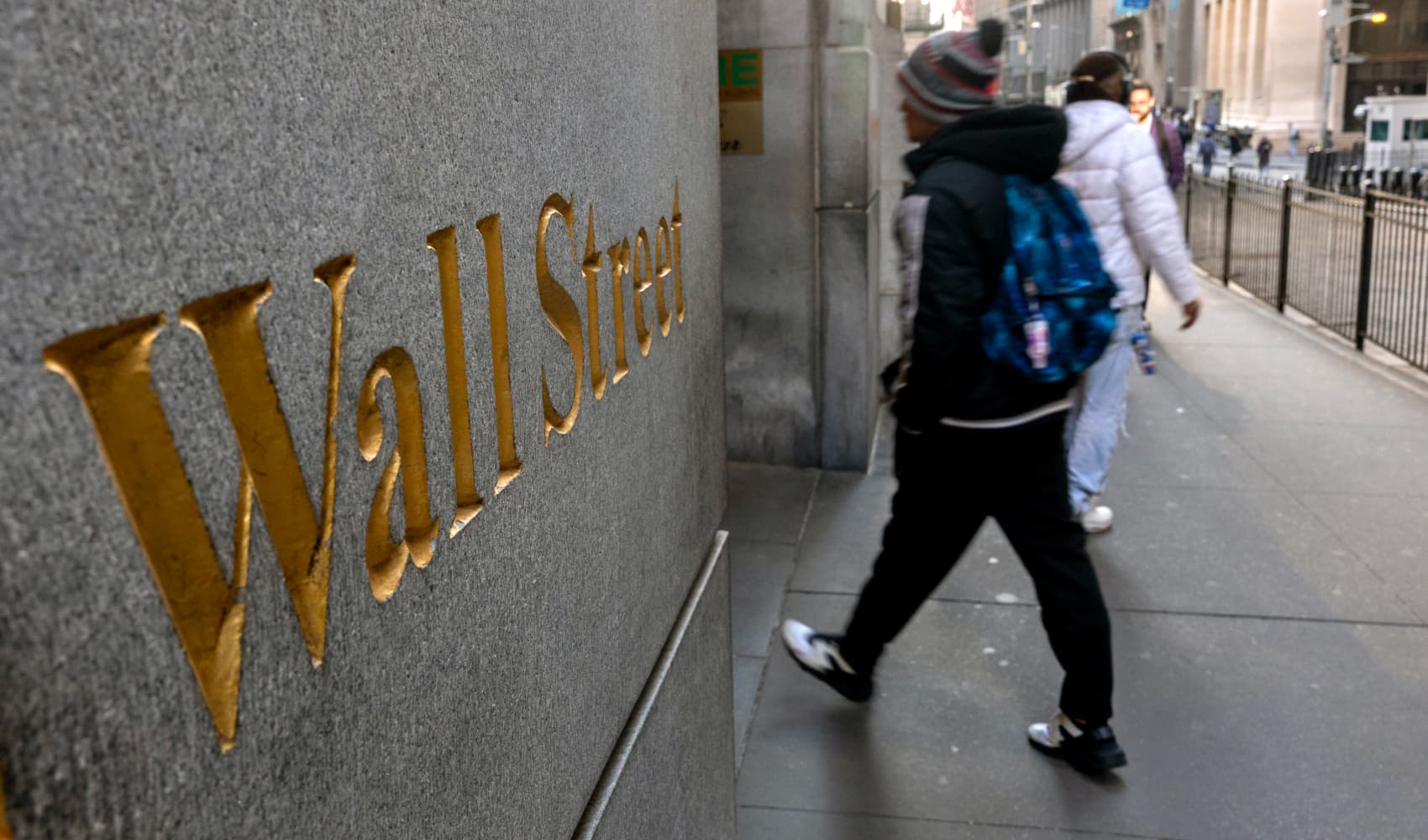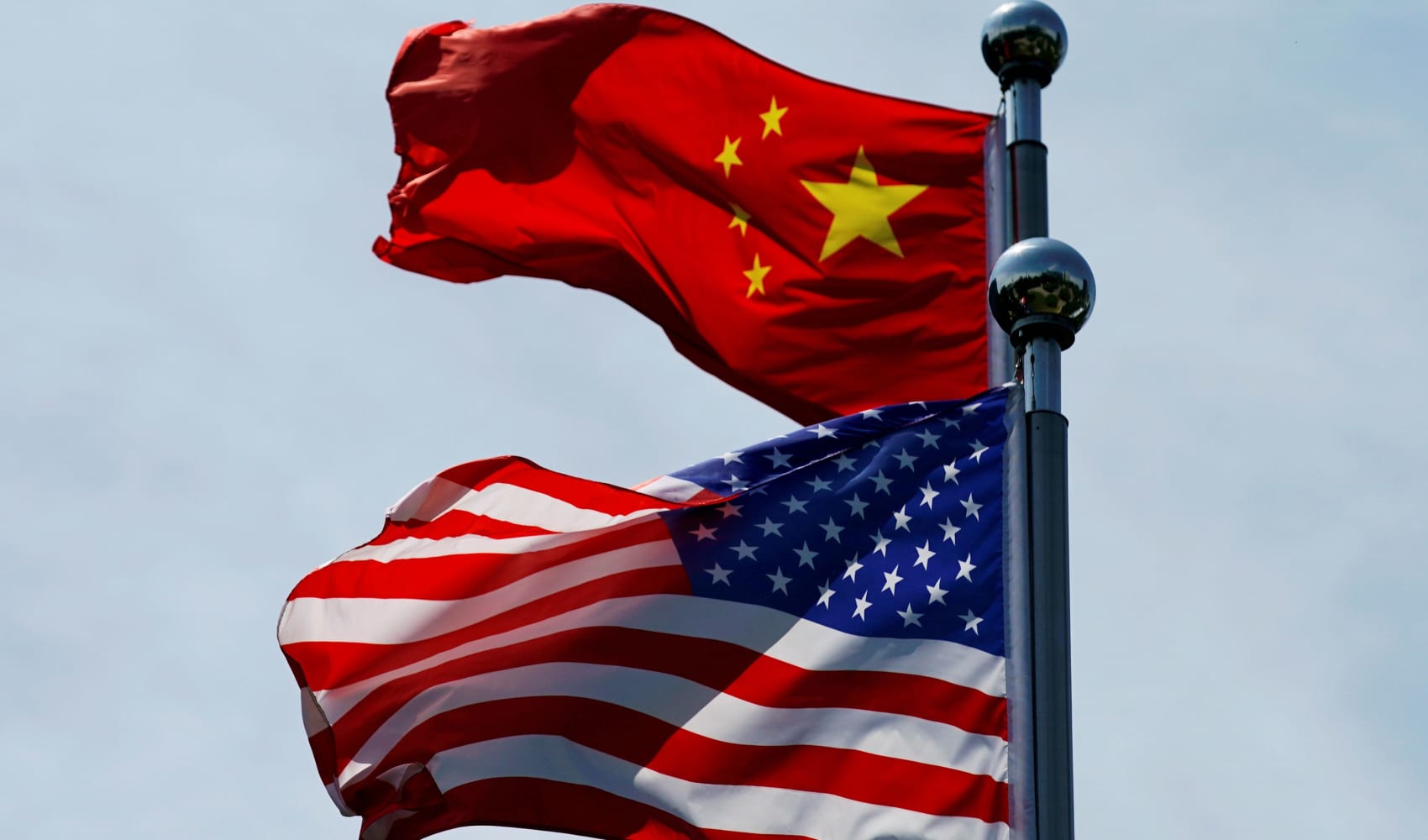
Night shot of Sydney, Australia. Darling harbour in the middle left, looking right out to the horizon where the sun has just set.
This is CNBC's live blog covering Asia-Pacific markets.
Asia-Pacific markets mostly climbed Tuesday, recovering from a sharp sell-off in the previous session as investors awaited clarity on U.S. President Donald Trump's tariff rollout.
Australia's S&P/ASX 200 rose 1.04% to end the day at 7,925.20, after the Reserve Bank of Australia held interest rates at 4.1%, in line with expectations, as the country heads to the polls on May 3.
Watch NBC 4 free wherever you are
Japan's benchmark Nikkei 225 pared earlier gains to end the day flat at 35,624.48, while the broader Topix index was closed up 0.11% at 2,661.73.
Over in South Korea, the Kospi index advanced 1.62% to end the day at 2,521.39 while the small-cap Kosdaq surged 2.76% to 691.45.
Get Tri-state area news delivered to your inbox with NBC New York's News Headlines newsletter.
Mainland China's CSI 300 pared earlier gains to end the day flat at 3,887.68, while Hong Kong's Hang Seng Index increased 0.38% to close at 23,206.84.
China's Caixin PMI for March came in at 51.2, compared to the 51.1 reading penciled by economists in Reuters' poll, and slightly higher than the 50.8 reading in the previous month.
Money Report
India's benchmark Nifty 50 fell 1.54% while the broader BSE Sensex dropped 1.84% as at 1.45 p.m. local time.
U.S. futures slipped as investors awaited clarity on Trump's upcoming tariff plans.
Overnight, two of the three key benchmark indexes on Wall Street ended the session in positive territory.
The S&P 500 clawed back earlier losses on to end the session higher. The broad market index added 0.55% to close at 5,611.85. At one point, it fell as much as 1.65% and traded 10% below its record.
The Nasdaq Composite fell 0.14% and closed at 17,299.29. The Dow Jones Industrial Average advanced 417.86 points, or 1%, to settle at 42,001.76.
— CNBC's Brian Evans and Lisa Kailai Han contributed to this report.
Indian stocks fall over 1%
Indian stocks were back in negative territory as of 12.30 p.m. local time on Tuesday.
The benchmark Nifty 50 fell 1.18%, extending losses from the previous session. The index is down 1.83% so far this year.
Meanwhile, the broad based Sensex was down 1.57%.
— Amala Balakrishner
Hanwha Aerospace shares rise nearly 9% as South Korean market watchdog questions share issue
Shares of Hanwha Aerospace rose as much as 8.77% Tuesday, reversing course from three straight days of losses.
This comes after South Korea's Financial Supervisory Service reportedly pressed the company to further explain how a proposed 3.6 trillion won ($2.46 billion) equity raising fits with its broader restructuring plans.
The financial market watchdog reportedly ordered the defense company to resubmit a filing on its capital raising plans last week on the grounds that it lacked information needed for shareholders to make rational investment decisions, according to Reuters.
The moves in Hanwha Aerospace also come after its parent company Hanwha Group's chairman Kim Seung Youn transferred a 11.32% stake to his three sons, as part of his succession plans.
Hanwha Aerospace reportedly said on Tuesday that its executives - including one of Kim's sons - had purchased about 9 billion Korean won worth of shares to indicate their will to raise shareholder value.
— Amala Balakrishner, Reuters
Xiaomi shares plunge 5.5% after fatal accident involving its EV kills three
Shares of Chinese tech giant Xiaomi plunged over 5.5% on Tuesday afternoon, as it came under pressure following a fatal accident involving its electric vehicle.
Chinese local media reported Tuesday an accident last Saturday where a Xiaomi SU7 sedan crashed into the guardrails on a highway in Anhui province and exploded, killing three people who were in the car.
The news sent the shares lower to HK$46.65 ($6), according to LSEG data, reversing gains in the morning session.
Xiaomi said in a statement that it has set up a special work group and was actively cooperating with police to investigate the case.
The company said last month it sold over 29,000 SU7 electric sedans, with its first model launched in March last year. It also said it was "confident" it will hit its annual delivery target of 350,000 units.
— Anniek Bao
Outlook for emerging markets more uncertain than during Trump's previous term: J.P. Morgan Private Bank
The uncertainty over U.S. President Donald Trump's tariff plans presents a more uncertain outlook for emerging markets now, compared to his previous term, Alex Wolf, head of Asia investment strategy at J.P. Morgan Private Bank said.
"The previous trade conflict led to supply chain redirection that benefited several EMs, this time could be different as tariffs are expected to be applied more broadly," he wrote in a Tuesday note.
"With trade tensions escalating, the outlook is becoming cloudier, and investors will need to be more selective," Wolf added.
Valuations of Indian equities are seemingly "more attractive," given the sell-off in the market and small share of GDP that trade accounts for, he explained.
Looking ahead, Wolf reckoned that EMs can move higher if the U.S. dollar continues to weaken and the impact of tariffs on overall trade is subdued.
Conversely, he argued that these markets will "undoubtedly feel the pressure" if the dollar strengthens and global trade stalls.
— Amala Balakrishner
Australian dollar appreciates marginally against the U.S. dollar after RBA decision
The Australian dollar appreciated 0.03% against the U.S. dollar to 0.6248 as at 3.02 p.m. Australian Eastern Daylight Time on Tuesday.
This follows the Reserve Bank of Australia's decision to hold interest rates steady at 4.1%, as expected by market watchers.
Other currencies in Asia-Pacific also mostly strengthened against the dollar.
The New Zealand dollar had appreciated 0.11% to 0.5672 against the dollar, while the Korean won had gained 0.13% against the dollar to 1,480.10.
Meanwhile, the Indian rupee weakened marginally by 0.03% against the dollar to 85.4760.
— Amala Balakrishner
Reserve Bank of Australia expectedly keeps interest rates steady at 4.1%
The Reserve Bank of Australia on Tuesday expectedly held its benchmark policy rate at 4.1%, despite having flagged earlier that inflation was declining at a faster pace than expected.
The country's inflation reading in February came in at a softer-than-expected 2.4%.
In its last meeting, the central bank said that "some of the upside risks to inflation appear to have eased," while cautioning that if monetary policy was eased "too much too soon," it could impede the progress on inflation.
Read the full story, here.
— Lim Hui Jie
Taiwan's Taiex benchmark rises over 2%
Taiwan's benchmark Taiex index rose 2.24% as at 10.28 a.m. local time, reversing course from losses in four straight sessions.
The increase was broad-based across industries, with gains led by the basic materials, energy and technology sectors.
The top three performers include Champion Building Materials, which surged 9.98%, Luo Lih Fen Holding which increased 9.98% and Aero Win Technology which added 9.84%.
The iShares MSCI Taiwan ETF shows the index's moves:
— Amala Balakrishner
South Korea's exports grow 3.1% in March to $58.24 billion
South Korea's exports grew 3.1% in March compared with 0.7% the month before, according to preliminary figures released by the government on Tuesday.
The latest reading marks two straight months of growth in the country's exports but missed the 3.5% rise expected by economists in a Reuters' poll.
Outbound shipments from South Korea stood at $58.24 billion.
Meanwhile, its imports grew 2.3% to $53.29 billion, resulting in a preliminary trade surplus of $4.99 billion for March.
A separate survey released on Tuesday indicated that South Korea's factory activity shrank marginally to 49.1 in March, from 49.9 in the previous month following weak domestic demand.
— Amala Balakrishner
China's factory activity growth at four-month high in March, private survey shows
Activity in China's manufacturing sector expanded at its fastest pace in four months in March, as growth in overseas demand accelerated, a private survey showed on Tuesday.
The Caixin/S&P Global manufacturing purchasing managers' index came in at 51.2 in March, beating the median estimate of 51.1 in a Reuters poll, marking a modest upturn from 50.8 in February.
Total new orders, a gauge of overall demand, expanded for the sixth straight month, Caixin said, while new export orders grew at the quickest rate in nearly a year.
The labor market also ended six months of contraction, expanding for the first time in 19 months, the report said.
"The economy had a stable start to the year, with signs of further recovery and improvement," said Wang Zhe, a senior economist at Caixin Insight Group. However, he cautioned that the job market remained relatively sluggish and deflationary pressures persist due to "insufficient effective demand at home and market participants' weak optimism."
The reading came after the official PMI released by the National Bureau of Statistics on Monday showed manufacturing activity in China grew at the fastest pace in a year, rising to 50.5 in March.
— Anniek Bao
Hanwha Corp shares surge over 16% after chairman transfers 11.3% stake to sons
Shares of Hanwha Corp rose as much as 16.72% Tuesday, after the company's chairman Kim Seung Youn transferred 11.32% of his 22.65% stake to his three sons on Monday.
The move is part of the chaebol's succession planning and ensures continuity in the family's control over the business.
Hanwha Group is South Korea's seventh-largest conglomerate by assets, according to the country's Fair Trade Commission.
Shares of Hanwha Corp's subsidiaries also increased, with Hanwha Aerospace trading up 5.10% as at 10.40 a.m. local time, and Hanwha Energy advanced 9.04%.
— Amala Balakrishner
Spot gold crosses $3,130, hitting fresh record
Spot gold hit a fresh record high of $3,132.17 at 9.15 a.m. Singapore time on Tuesday, after crossing the $3,100 threshold on Monday.
The price of the precious metal has been on the rise as investors flock to the safe haven asset amid concerns around U.S. President Donald Trump's fresh tariffs.
— Amala Balakrishner
Sentiment among Japanese manufacturers worsens
Business sentiment among Japan's biggest manufacturers has worsened in the first three months of the year, the Bank of Japan's closely watched Tankan survey released on Tuesday showed.
The survey was compiled before U.S. President Donald Trump's announcement last week of a plan to impose tariffs on auto imports.
The headline index measuring big manufacturers' business confidence stood at +12 in March, down from +14 in December, the survey showed. This is the worst reading in the last four quarters.
Meanwhile, an index gauging sentiment among big non-manufacturers climbed to +35 from +33 in December.
Big companies expect capital expenditure to increase by 3.1% in the current fiscal year ending in March 2026, compared with a 2.9% rise expected by Reuters, the survey showed. This is slower than a 11.3% increase for the previous fiscal year that ended in March.
— Amala Balakrishner
Japan reports unemployment of 2.4% in February, slightly lower than estimates
Japan's unemployment rate edged down to 2.4% in February, compared with the 2.5% in the previous month, government data released Tuesday showed.
This is its lowest reading since December 2024 and is also slightly below Reuters' poll estimate of 2.4%.
The country's jobs-to-applicants ratio came in at 1.24, slightly lower than the 1.26 forecast by Reuters.
— Amala Balakrishner
Nvidia, Tesla, Meta shave losses, pulling market off lows
One factor helping stocks turn positive after steep early losses Monday was when three of the Magnificent 7 stocks came well off their lows.
Nvidia and Tesla had been down about 3% at one point but most recently were off about 2% apiece. Meta Platforms earlier was off 1% but had erased most of its losses into the final hour of trading.
However, the Nasdaq Composite, home to most of the market's teach giants, was still off about 0.3%, while the S&P 500 and Dow Jones Industrial Average posted solid gains.
—Jeff Cox






